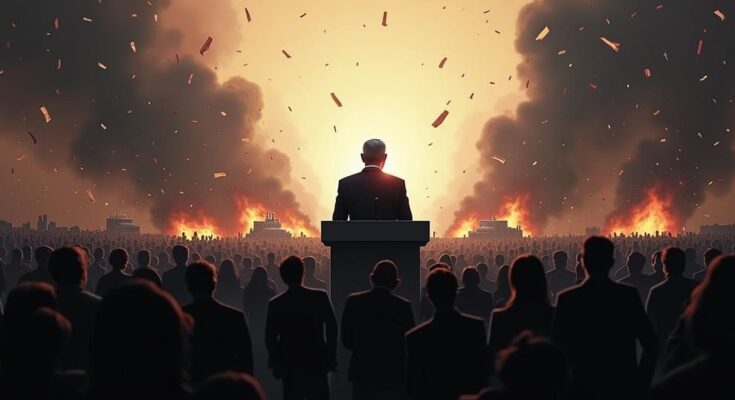During the 79th U.N. General Assembly, Israeli Prime Minister Netanyahu confronted the assembly with a choice between pursuing peace or facing Iranian aggression. He emphasized Israel’s commitment to peace while highlighting military successes against Hamas. Conversely, Palestinian President Abbas condemned Israeli actions in Gaza, calling for a cease-fire and humanitarian aid, framing the ongoing conflict as a humanitarian crisis.
In a compelling address to the 79th United Nations General Assembly, Israeli Prime Minister Benjamin Netanyahu presented a stark choice for the international community: pursue a path towards peace or face the repercussions of Iranian aggression. Netanyahu envisioned a hopeful future where a comprehensive peace agreement in the Middle East could pave the way for infrastructural partnerships between Jewish and Arab nations, creating a land bridge that connects Asia and Europe. Conversely, he warned of the dangers posed by what he termed an “arc of terror” spearheaded by Iran, threatening stability across the region. To illustrate his points, Netanyahu displayed two maps that depicted the potential outcomes of the conflict. He posed a rhetorical question to those present: “Which of these two maps that I showed you will shape our future?” He emphasized Israel’s desire for peace, asserting that despite the ongoing violence, Israel has always yearned for and will continue to seek peace. Netanyahu’s remarks followed a pointed speech by Palestinian President Mahmoud Abbas, who accused Israel of committing genocide in Gaza while calling for an urgent cease-fire and humanitarian assistance. Abbas reported devastating statistics from the conflict, including the death of 40,000 Palestinians and highlighted the plight of the Gazan populace. In defense of Israel’s military actions, Netanyahu stated that no other army had made greater efforts to minimize civilian casualties. He asserted that the Israel Defense Forces (IDF) had undertaken various initiatives, such as issuing warnings via flyers and text messages, to ensure the safety of civilians. Netanyahu expressed his resolve, emphasizing that the IDF had achieved significant military success against Hamas while lamenting the loss of innocent lives. During his address, Netanyahu condemned Iran as both a financier and puppet master behind Hamas, declaring that any Iranian aggression would be met with a forceful response from Israel. He highlighted the ongoing threat posed by Hezbollah in Lebanon and the Houthi military actions from Yemen, reinforcing his message of vigilance in confronting Iranian threats. Netanyahu urged the international community to unite in thwarting Iran’s nuclear ambitions, claiming such a program would endanger nations globally. He called on the U.N. Security Council to reinstate sanctions against Iran while asserting Israel’s military achievements against Hamas, noting the degradation of its military capabilities. As the assembly continued, Abbas put forward proposals for a post-war scenario in Gaza, calling for a permanent cease-fire and removal of Israeli forces, alongside international protection for Palestinians. He reiterated the need for recognition of Palestine as a sovereign state, framing this recognition as essential for lasting peace.
The ongoing conflict between Israel and Palestine has resulted in escalating violence and humanitarian crises, particularly in Gaza. This tension has manifested through military confrontations, with accusations on both sides regarding violations of human rights and targeting of civilians. The U.N. General Assembly serves as a platform for international leaders to address these critical issues, allowing them to propose solutions while presenting their narratives to the global community. This year, high-profile addresses by both Israeli Prime Minister Benjamin Netanyahu and Palestinian President Mahmoud Abbas highlighted the deep division and contrasting perspectives regarding the conflict and peace efforts.
Netanyahu’s address at the U.N. laid bare the dichotomy of peace versus aggression, urging the assembly to recognize Israel’s commitment to peaceful resolutions while underscoring the existential threat posed by Iran. In contrast, Abbas’s passionate plea for Palestinian rights and dignity emphasized the humanitarian toll inflicted by the ongoing conflict. As both leaders outlined their visions for future peace, it became evident that without mutual recognition and respect, achieving stability in the region remains a formidable challenge.
Original Source: www.upi.com




